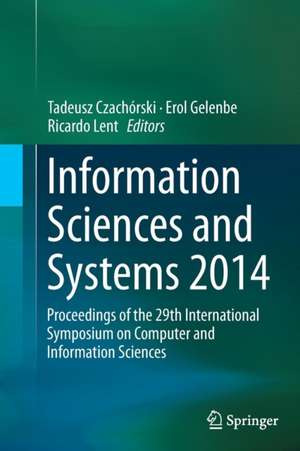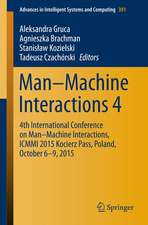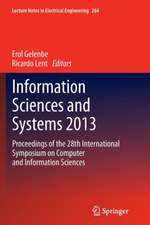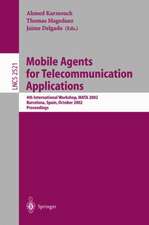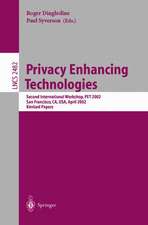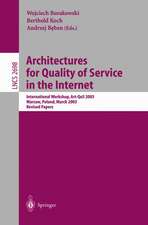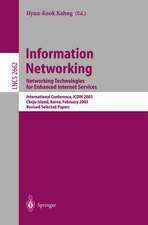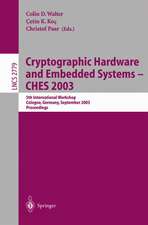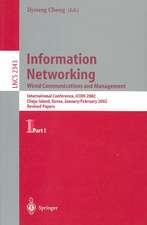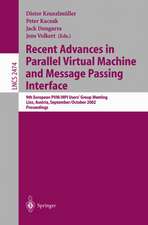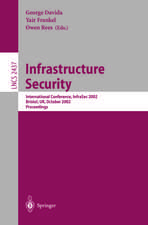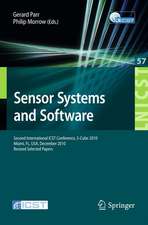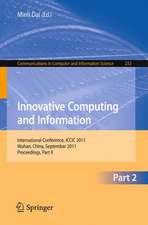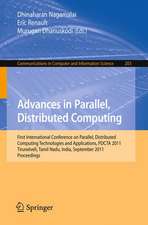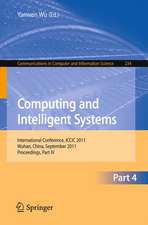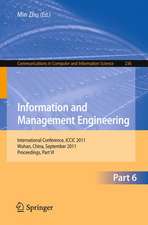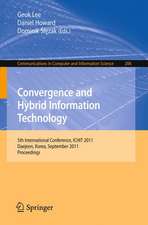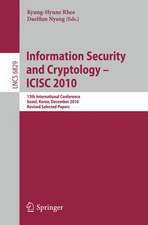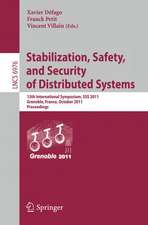Information Sciences and Systems 2014: Proceedings of the 29th International Symposium on Computer and Information Sciences
Editat de Tadeusz Czachórski, Erol Gelenbe, Ricardo Lenten Limba Engleză Paperback – 9 sep 2016
The topics covered include (but are not limited to) computer architectures and digital systems, algorithms, theory, software engineering, data engineering, computational intelligence, system security, computer systems and networks, performance modeling and analysis, distributed and parallel systems, bioinformatics, computer vision and significant applications such as medical informatics and imaging.
The 29th International Symposium on Computer and Information Sciences (ISCIS 2014) took place in Krakow Old City, Poland on October, 27–8, 2014.
| Toate formatele și edițiile | Preț | Express |
|---|---|---|
| Paperback (1) | 652.73 lei 6-8 săpt. | |
| Springer International Publishing – 9 sep 2016 | 652.73 lei 6-8 săpt. | |
| Hardback (1) | 659.17 lei 6-8 săpt. | |
| Springer International Publishing – 7 oct 2014 | 659.17 lei 6-8 săpt. |
Preț: 652.73 lei
Preț vechi: 815.91 lei
-20% Nou
Puncte Express: 979
Preț estimativ în valută:
124.90€ • 130.40$ • 103.37£
124.90€ • 130.40$ • 103.37£
Carte tipărită la comandă
Livrare economică 04-18 aprilie
Preluare comenzi: 021 569.72.76
Specificații
ISBN-13: 9783319363295
ISBN-10: 3319363298
Pagini: 440
Ilustrații: XVII, 423 p. 130 illus., 90 illus. in color.
Dimensiuni: 155 x 235 x 23 mm
Greutate: 0.62 kg
Ediția:Softcover reprint of the original 1st ed. 2014
Editura: Springer International Publishing
Colecția Springer
Locul publicării:Cham, Switzerland
ISBN-10: 3319363298
Pagini: 440
Ilustrații: XVII, 423 p. 130 illus., 90 illus. in color.
Dimensiuni: 155 x 235 x 23 mm
Greutate: 0.62 kg
Ediția:Softcover reprint of the original 1st ed. 2014
Editura: Springer International Publishing
Colecția Springer
Locul publicării:Cham, Switzerland
Cuprins
A New Channel Access Approach for the IEEE 802.15.4 Devices in 2.4 GHz ISM Band.- A Parametric Study of CPN’s Convergence Process.- Multi-cell Resource Block Allocation Framework.- An Implementation of Voice over IP in the Cognitive Packet Network.- A Cooperative Emergency Navigation Framework using Mobile Cloud Computing.- Integer Linear Programming Solution for the Multiple Query Optimization Problem.- A Graphical Model Approach for Multi-Label Classification.- Ground Plane Detection Using an RGB-D Sensor.- An iterated local search platform for transportation logistics.- On Fuzzy Extensions to Energy Ontologies for Text Processing Applications.- Evaluating quality of dispersion based fixation detection algorithm.
Notă biografică
Prof. Erol Gelenbe of Imperial College London is a Fellow of the French National Academy of Engineering, a Fellow of both IEEE and ACM and Fellow of the Polish Academy of Sciences, the Hungarian Academy of Sciences and the Turkish Science Academy. He received the In Memoriam Dennis Gabor Award that recognises outstanding science with significant innovation content, from the Hungarian Science Academy honouring the memory of Gabor, the 1971 Nobel Laureate in Physics and an inventor, on 19th December 2013. Described by E&T Magazine as a "true IT Innovator", Erol won IET's 2010 Oliver Lodge Medal. In awarding him the ACM SIGMETRICS 2008 Life-Time Achievement Award ACM stated that he is "the single individual who, over a span of 30 years, has made the greatest overall contribution to the field of Computer System and Network Performance Evaluation". Other awards include the 1996 France-Telecom Prize of the French Academy of Sciences and the 1994 Parlar Foundation Science Award of Turkey. He is known for creating the team the built the QNAP Performance Evaluation Software Package and for inventing the FEXSIM approach to Object Oriented Flexible Manufacturing System Simulation. He has introduced the stochastic system models known as G-Networks and the Random Neural Network model. He developed the first fiber optics based random access network XANTHOS and the multi-microprocessor voice switch SYCOMORE.
Dr. Ricardo Lent joined the Department of Engineering Technology at the University of Houston, Texas, as an assistant professor in January 2013. His prior position was Research Fellow in the Intelligent Systems and Networks Group at Imperial College London (United Kingdom). He holds a Ph.D. and M.Sc. in Computer Science from the University of Central Florida, a M.Sc. in Telecommunications from Universidad Nacional de Ingenieria and a B.Sc. in Electronic Engineering from Universidad Ricardo Palma. Dr. Lent's prior experience includes work as a Principal Network Engineer for industry and as a Visiting Assistant Professor at the University of Central Florida. His research interests are in pervasive networks and emerging topics in computer networks and distributed computing, such as self-adapting networks, mobile ad hoc networks, wireless sensor networks, virtualization and cloud computing. As a post-doctoral fellow at Imperial he participated in many funded European research projects, including UK Engineering and Physical Sciences Research Council (EPSRC), UK Defence Technology Centre in Data and Information Fusion, CASCADAS, Design of an Interoperable European Federated Simulation Network for Critical Infrastructures and Fit4Green.
Prof. Tadeusz Czachórski received M.Sc., Ph.D., D.Sc. degrees in informatics respectively in 1972, 1979, 1988 and professor title in 1999. Currently he is a professor at the Silesian University of Technology (Division of Computer Systems Theory and Design) and the director of the Institute of Theoretical and Applied Informatics of Polish Academy of Sciences, IITiS PAN, Gliwice. He spent more than five years at several French universities and research institutes (IRISA Rennes, University of Versailles, ISEM Orsay Paris-Sud, Paris-Nord, National Institute of Telecommunication) and still maintains scientific cooperation with these centres. He also participated in Next Generation Internet European project concerning such issues as multiservice-multimedia, mobility, services convergence, quality of service and variable connectivity, where he was coresponsible for the work package concerning analytical, numerical and simulation methods to model performance of the Internet. Currently he is a member of Polish project Future Internet Engineering. He is a member of programme committees of some periodic international and national conferences, e.g. Heterogeneous Networks HET-NETS, European Workshop on Performance Engineering EPEW, Polish Teletraffic Symposium, Computer Networks, Internet in the Information Society, currenly also International Symposium on Modeling, Analysis and Simulation of Computer and Telecommunication Systems (MASCOTS) and COMPSAC. 1990 - 2007 he was scientific secretary of the Committee of Informatics of Polish Academy of Sciences, 2007 - 2011 vice-president of this committee, currently member of presidium and head of the section of computer networks and distributed systems of the committee. His scientific interests include mathematical methods and software related to modelling and performance evaluation of wide area computer networks, especially the Internet. The methods include Markov chains, diffusion approximation and fluid flow approximation. They are used to study quality of service, traffic control mechanisms and related problems.
Dr. Ricardo Lent joined the Department of Engineering Technology at the University of Houston, Texas, as an assistant professor in January 2013. His prior position was Research Fellow in the Intelligent Systems and Networks Group at Imperial College London (United Kingdom). He holds a Ph.D. and M.Sc. in Computer Science from the University of Central Florida, a M.Sc. in Telecommunications from Universidad Nacional de Ingenieria and a B.Sc. in Electronic Engineering from Universidad Ricardo Palma. Dr. Lent's prior experience includes work as a Principal Network Engineer for industry and as a Visiting Assistant Professor at the University of Central Florida. His research interests are in pervasive networks and emerging topics in computer networks and distributed computing, such as self-adapting networks, mobile ad hoc networks, wireless sensor networks, virtualization and cloud computing. As a post-doctoral fellow at Imperial he participated in many funded European research projects, including UK Engineering and Physical Sciences Research Council (EPSRC), UK Defence Technology Centre in Data and Information Fusion, CASCADAS, Design of an Interoperable European Federated Simulation Network for Critical Infrastructures and Fit4Green.
Prof. Tadeusz Czachórski received M.Sc., Ph.D., D.Sc. degrees in informatics respectively in 1972, 1979, 1988 and professor title in 1999. Currently he is a professor at the Silesian University of Technology (Division of Computer Systems Theory and Design) and the director of the Institute of Theoretical and Applied Informatics of Polish Academy of Sciences, IITiS PAN, Gliwice. He spent more than five years at several French universities and research institutes (IRISA Rennes, University of Versailles, ISEM Orsay Paris-Sud, Paris-Nord, National Institute of Telecommunication) and still maintains scientific cooperation with these centres. He also participated in Next Generation Internet European project concerning such issues as multiservice-multimedia, mobility, services convergence, quality of service and variable connectivity, where he was coresponsible for the work package concerning analytical, numerical and simulation methods to model performance of the Internet. Currently he is a member of Polish project Future Internet Engineering. He is a member of programme committees of some periodic international and national conferences, e.g. Heterogeneous Networks HET-NETS, European Workshop on Performance Engineering EPEW, Polish Teletraffic Symposium, Computer Networks, Internet in the Information Society, currenly also International Symposium on Modeling, Analysis and Simulation of Computer and Telecommunication Systems (MASCOTS) and COMPSAC. 1990 - 2007 he was scientific secretary of the Committee of Informatics of Polish Academy of Sciences, 2007 - 2011 vice-president of this committee, currently member of presidium and head of the section of computer networks and distributed systems of the committee. His scientific interests include mathematical methods and software related to modelling and performance evaluation of wide area computer networks, especially the Internet. The methods include Markov chains, diffusion approximation and fluid flow approximation. They are used to study quality of service, traffic control mechanisms and related problems.
Textul de pe ultima copertă
Based on a rigorous selection of submissions to The 29th International Symposium on Computer and Information Sciences (ISCIS 2014), this books includes some of the most recent ideas and technical results in computer systems, computer science, and computer-communication networks. It offers the reader a timely access to innovative research and advances in computing and communications from many different areas of the world.
The topics covered include (but are not limited to) computer architectures and digital systems, algorithms, theory, software engineering, data engineering, computational intelligence, system security, computer systems and networks, performance modeling and analysis, distributed and parallel systems, bioinformatics, computer vision and significant applications such as medical informatics and imaging.
The 29th International Symposium on Computer and Information Sciences (ISCIS 2014) took place in Krakow Old City, Poland on October, 27–8, 2014.
The topics covered include (but are not limited to) computer architectures and digital systems, algorithms, theory, software engineering, data engineering, computational intelligence, system security, computer systems and networks, performance modeling and analysis, distributed and parallel systems, bioinformatics, computer vision and significant applications such as medical informatics and imaging.
The 29th International Symposium on Computer and Information Sciences (ISCIS 2014) took place in Krakow Old City, Poland on October, 27–8, 2014.
Caracteristici
Presents up-to-date coverage of computer science and advanced network systems
Provides a compact world-wide view of research in computer systems and networks
Opens new vistas for computer science and systems research and the Internet
Includes supplementary material: sn.pub/extras
Provides a compact world-wide view of research in computer systems and networks
Opens new vistas for computer science and systems research and the Internet
Includes supplementary material: sn.pub/extras
